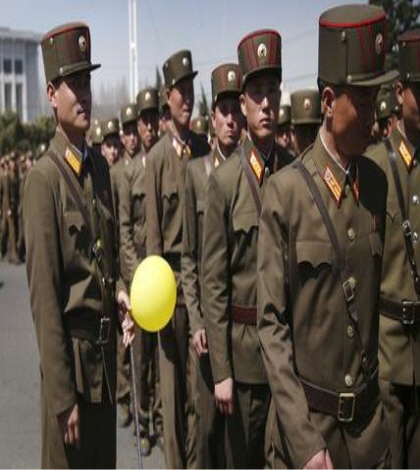- California Assembly OKs highest minimum wage in nation
- S. Korea unveils first graphic cigarette warnings
- US joins with South Korea, Japan in bid to deter North Korea
- LPGA golfer Chun In-gee finally back in action
- S. Korea won’t be top seed in final World Cup qualification round
- US men’s soccer misses 2nd straight Olympics
- US back on track in qualifying with 4-0 win over Guatemala
- High-intensity workout injuries spawn cottage industry
- CDC expands range of Zika mosquitoes into parts of Northeast
- Who knew? ‘The Walking Dead’ is helping families connect
JAPAN PM: NKOREA MAY BE CAPABLE OF SARIN-LOADED MISSILES

North Korean soldiers walk in the Ryomyong residential area after attending its official opening ceremony on Thursday, April 13, 2017, in Pyongyang, North Korea. Japan’s Prime Minister Shinzo Abe, speaking at a parliamentary panel on national security and diplomacy, warned Thursday that North Korea may be capable of firing a missile loaded with sarin nerve gas toward Japan. (AP Photo/Wong Maye-E)
TOKYO (AP) — Prime Minister Shinzo Abe warned Thursday that North Korea may be capable of firing a missile loaded with sarin nerve gas toward Japan, as international concern mounted that a missile or nuclear test by the authoritarian state could be imminent.
“There is a possibility that North Korea is already capable of shooting missiles with sarin as warheads,” Abe told a parliamentary panel on national security and diplomacy.
Abe was responding to a question about Japan’s readiness at a time of increased regional tension. A U.S. navy aircraft carrier is heading toward the Korean Peninsula as Pyongyang prepares for the 105th anniversary of the birth of its founder Kim Il Sung this weekend. And with U.S.-South Korean wargames ongoing, North Korean has intensified rhetoric warning it would retaliate strongly against any aggression.
South Korea has long said it believes the North can conduct its sixth nuclear test whenever it chooses. The 38 North website , which monitors North Korea, said that satellite imagery of the country’s Pyunggye-ri nuclear test site suggests it is “primed and ready” for an explosion.
Researchers Joseph S. Bermudez Jr. and Jack Liu wrote that images taken Wednesday show continued activity around the site’s north portal, as well as personnel and pallets of equipment or supplies in the main administrative area.
North Korea, which never signed the international Chemical Weapons Convention, is believed to have up to 5,000 tons of chemical weapons, according to a South Korean defense white paper, though the North has never acknowledged it.
Experts say if North Korea were to attack South Korea, it would likely target Seoul’s defenses with chemical and biological weapons dropped from aircraft or delivered via missiles, artillery and grenades.
Abe cited Syria, where dozens of people died recently in an alleged sarin nerve gas attack, as an example that Japan should take seriously, stressing the need to strengthen its deterrence against the North.
Japan has taken a few steps this week to reassure the public about its effort to protect the public. On Tuesday, the Foreign Ministry issued a travel advisory to Japanese residents and tourists in South Korea, reminding them of a growing tension. Chief Cabinet Secretary Yoshihide Suga denied any “imminent danger,” however.
Later Thursday, Abe called a National Security Council meeting to analyze the latest North Korea developments and ways to respond in case of a “provocation” from Pyongyang, said Suga, a council member. North Korea has amassed “substantial amount” of chemical weapons produced at several facilities, he added, without citing sources.
The rising tension and the Trump administration’s more assertive policy toward North Korea are apparently helping Abe’s government gain public support for a stronger defense.
Japan, under its postwar constitution, has limited the role of its military to self-defense only and relied on the U.S. for offensive and nuclear capability. But recently, Abe’s ruling party has proposed that Japan should bolster its missile defense, including upgrading the capability to shoot down an enemy missile and acquiring the capacity to attack the base it was fired from.
With President Donald Trump’s administration not ruling out a military option to dealing with North Korea, “tension is certainly rising,” Abe said Wednesday to a group of lawmakers from his ruling party who sought increased safety measures for Japanese nationals in case of an emergency.
North Korean leader Kim Jong Un, meanwhile, made a high-profile appearance highlighting his country’s economic development rather than its adversaries and military might, cutting a ceremonial ribbon to mark the opening of a new high-rise district.
The sprawling development project, built in just over a year, includes Pyongyang’s tallest apartments, at 70 stories. North Korean Premier Pak Pong Ju said the project “incorporates the latest architectural science and technology, including solar and geothermal technology, and the greening of roofs and walls.”
Kim, who arrived in a black limousine, did not make a speech.
Pyongyang has invited a large contingent of foreign media to cover the birth anniversary of Kim Il Sung, Kim Jong Un’s grandfather, and the modern and shiny new residential street is clearly one of the places officials most wanted the foreigners to see. The North’s military might is likely to regain center stage on Saturday’s anniversary, when a large-scale military parade is expected.











